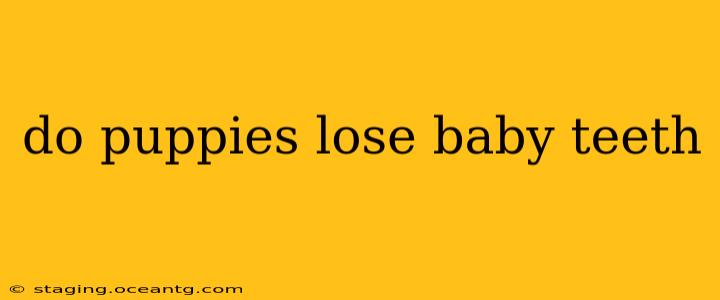Do Puppies Lose Baby Teeth? A Comprehensive Guide to Puppy Dentition
Yes, just like human children, puppies lose their baby teeth! This process, known as deciduous dentition, is a normal and essential part of a puppy's development. Understanding this process can help you provide the best care for your furry friend during this transition.
This guide will cover everything you need to know about puppy teeth, including the timeline, common concerns, and how to support your puppy through this phase.
When Do Puppies Lose Their Baby Teeth?
Puppies typically begin losing their baby teeth (also called deciduous teeth) between the ages of 3 and 8 months. This isn't a precisely timed event; some breeds may shed their teeth earlier or later than others. Small breeds often lose their teeth a little faster than larger breeds. The process usually takes several weeks, and rarely does a puppy lose all their baby teeth at once. You might notice a few teeth falling out at a time, or your puppy might even swallow a tooth or two without you ever noticing!
What Happens During Puppy Tooth Loss?
The process is usually painless for the puppy. As the permanent teeth develop beneath the gums, they put pressure on the roots of the baby teeth, causing them to loosen. Your puppy might instinctively gnaw on toys and chew on things to help loosen these teeth. This chewing is completely normal and expected.
What Are the Signs My Puppy is Losing Teeth?
Several signs indicate your puppy is losing its baby teeth:
- Loose teeth: You might feel loose teeth when gently petting your puppy's gums.
- Missing teeth: You’ll notice some teeth are missing.
- Increased chewing: Your puppy might chew more frequently on toys or furniture. This is a natural way for them to help the process along.
- Slightly swollen gums: Some slight swelling around the gums is normal as the adult teeth erupt.
What Should I Do If My Puppy's Baby Teeth Don't Fall Out?
In most cases, you shouldn't interfere with the natural process of tooth loss. However, if a baby tooth is loose but doesn't fall out, and it's preventing a permanent tooth from coming in properly, you should consult your veterinarian. They may need to remove the baby tooth to prevent potential dental problems in the future. Never attempt to pull out a puppy's tooth yourself. This can be painful and potentially damaging to the gums and jaw.
How Can I Help My Puppy During This Time?
Providing your puppy with plenty of appropriate chew toys is crucial during this time. These toys can help loosen the baby teeth and satisfy your puppy's urge to chew. Avoid giving your puppy hard bones or other items that could damage their developing teeth or gums. Choose durable, puppy-safe toys designed to withstand vigorous chewing.
My Puppy Swallowed a Baby Tooth – Should I Worry?
No need to worry! Puppies often swallow their baby teeth without any issues. They’re small and usually easily digestible.
How Many Baby Teeth Do Puppies Have?
Puppies typically have 28 baby teeth, while adult dogs have 42 teeth. The difference is due to the lack of premolars in the puppy's baby teeth set.
When Should I Take My Puppy to the Vet About Teeth?
You should schedule a veterinary checkup for your puppy around the time they are losing their teeth. This is a good opportunity for your vet to assess the eruption of their permanent teeth and to catch any potential problems early. You should also contact your vet if you notice any signs of infection, excessive bleeding, or if a baby tooth seems stuck and is causing problems with the emergence of a permanent tooth.
By understanding the normal process of puppy tooth loss and providing proper care, you can ensure your furry companion enjoys a healthy and happy transition to their adult teeth. Remember that regular veterinary checkups are vital for maintaining your puppy’s overall oral health.
